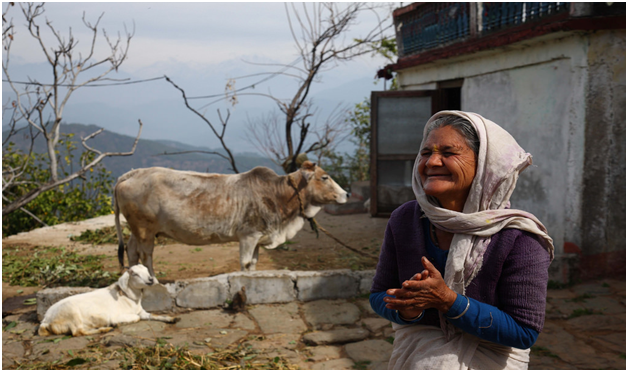Elderly in India: Ignored and Neglected
BENGALURU: With the recent passage of the much welcome Maternity Benefit (Amendment) Bill, 2016; there has been plenty of conversation about the need to make provisions for those who are care- takers for their elderly parents or relatives.
At present India has only one law to address the needs and rights of the elderly in the form of the Maintenance and Welfare of Senior Citizens and Parents Act 2007. The government of India had approved a National Policy for Senior Citizens in 1991 which was drafted in 2011, but is yet to be finalised and implemented.
In 2014 the Standing Committee on Social Justice and Empowerment submitted its report, recommending the following:
Implementation of Existing Policies, i.e.:
- Maintenance of Parents and Senior Citizens Act, 2007,
- Setting up a helpline for senior citizens,
- Establishing a National Commission for Senior Citizens, and
- Establishing a National Trust for the Aged
Apart from these the Standing Committee in its report also recommended the formulation of new policies and laws for the welfare of senior citizens. Some of the recommendations made with this regard were:
- A comprehensive law on social security
- Integrated Action plan involving all stakeholders
- National Policy on Older Persons
- Pensions, health insurance and tax exemption schemes
- National Council for senior citizens
- Expansion of old age homes and geriatric facilities
- Formulation of standard norms and guidelines for old age homes
With the increase in life expectancy rates the elderly population across the world has increased and continues to. In India it is expected that by 2050, 20 per cent of entire population would consist of elderly persons (60 and above). As per the 2011 census the elderly population in India stands at 76 million and is projected to rise to 323 million by 2050. With an already large and further growing elderly population there are very few laws, schemes and policies which ensure their welfare. As per Article 41, Directive Principles of the Constitution it is mandated that ‘the State shall, within the limits of its economic capacity and development, make effective provision for securing the right to work, to education and to public assistance in cases of unemployment, old age, sickness and disablement, and in other cases of undeserved want’, making care in old age a fundamental right.
However, in reality there seems to be very little that is being done to address the problems and challenges faced by senior citizens. The discussion around the need for leave provisions for those with elderly parents or relatives brings into notice the plight of the elderly in India, who have over time become marginalised section of society.
The National Policy for Senior Citizens was approved by the government in January, 1999, the first draft of which was made in 2011 – 12 years later and is yet to see daylight in its finalisation and drafting – an example of the kind of political will which exists in ensuring the welfare of senior citizens.
Senior citizens in India face a plethora of challenges ranging for abandonment, poor physical and mental health care and support, lack of understanding of old age issues, absence of any form of social security, poorly functioning old ages homes and absent care – giver support.
The writer while doing fieldwork in Latur, Maharashtra learnt that individuals who acquire disability as a result of old age are rarely extended disability benefits; in most case the disability is not taken seriously either and is ignored as simply something that is bound to be acquired with old age; furthermore several civil society organisations working in the disability sector too leave out senior citizens with acquired disabilities from their list of beneficiaries and intervention plans. While culturally and socially, elderly members of the family are treated with great respect in India, there is almost very little to nothing to ensure their welfare in society.
Cases of elderly neglect, abandonment and abuse are rampant across the country, most of which go unreported as a result of poor social and community support systems. The functioning and conditions of old age homes are abysmal too. There is a dearth of care taking facilities and care – givers; for the family care – givers there is little consideration in terms of leave, medical and financial benefits, which pose a challenge in several Indian households.
Despite the report of the Standing Committee on Social Justice and Empowerment on the implementation of schemes for the welfare of senior citizens in February, 2014, nothing seems to have progressed or changed. Given the present government’s skilling and development agenda, the aging population – which the state is obliged to ‘within the limits of its economic capacity and development, make effective provision’ for seems to find no place in the scheme of things, perhaps because they are not perceived as ‘economically productive’; due to which government after government has failed to show any political will to ensure the welfare of the senior citizens of the country.
While economic development is necessary and highly emphasised upon, it is vital to keep in mind that human development has to take place alongside - neither can be removed or in isolation from the other. The said process of development needs to be more holistic in nature and take into serious consideration social justice and welfare of various sections of society, particularly of the marginalised groups such as senior citizens, persons with disability, children, tribal communities, etc.
Given that the Maternity Benefit (Amendment) Bill, 2016 has begun the conversation, perhaps the time now is ripe to lobby for and bring to the forefront issues of senior citizens and ensure that the State fulfils its obligation towards the senior citizens of the country.





